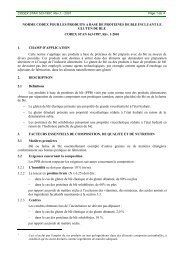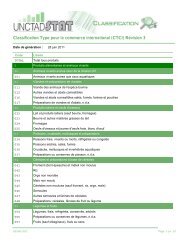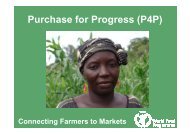issues and constraints related to the development of cashew nuts ...
issues and constraints related to the development of cashew nuts ...
issues and constraints related to the development of cashew nuts ...
You also want an ePaper? Increase the reach of your titles
YUMPU automatically turns print PDFs into web optimized ePapers that Google loves.
19Training was a constant request from nearly all farmer associations, including <strong>the</strong> larger ones,found, for example, in Côte d’Ivoire. It is vital that training is provided as soon as possible,especially for <strong>the</strong> smaller, new farmer associations (e.g. those found in Guinea <strong>and</strong> Ghana),before problems are encountered <strong>and</strong> enthusiasm wanes. Training needs <strong>to</strong> be given inaccounting, management, transparency, communication, etc. Obviously, specialised input coulddecide <strong>the</strong> most appropriate course <strong>of</strong> action, but a well-trained cadre <strong>of</strong> farmer associationspecialists in each country is a minimum prerequisite. These people in turn could train <strong>and</strong>support <strong>the</strong> developing associations.Right balance between food security <strong>and</strong> diversification <strong>of</strong> cash cropsAchieving an appropriate level <strong>of</strong> diversification <strong>of</strong> risk for farmers is important for long-termstability. In Guinea Bissau rice production was declining, due, partly at least <strong>to</strong> increased <strong>cashew</strong>planting. As a result rice imports had increased. In semi-arid areas <strong>cashew</strong> can have acompetitive advantage over some o<strong>the</strong>r food crops. Thus, putting a higher proportion <strong>of</strong> farmerresources in<strong>to</strong> increasing <strong>cashew</strong> production at <strong>the</strong> expense <strong>of</strong> food security is acceptable,providing <strong>cashew</strong> prices remain attractive <strong>and</strong> <strong>the</strong> income generated is more than enough <strong>to</strong> buyfood for <strong>the</strong> family. Serious problems can arise, however, if <strong>cashew</strong> prices become unattractive,or yields decline drastically. It is <strong>the</strong>refore important <strong>to</strong> get <strong>the</strong> right balance between foodsecurity <strong>and</strong> diversity <strong>of</strong> cash crops. This is especially so for tree crops, which have a muchlonger time frame <strong>to</strong> maturity than annual crops.An example <strong>of</strong> over-reliance on a single cash crop was that <strong>of</strong> mangoes in <strong>the</strong> Kankan region <strong>of</strong>Guinea. Mangoes were <strong>the</strong> most important cash crop until <strong>the</strong> mango-processing fac<strong>to</strong>ry inKankan closed in <strong>the</strong> 1980’s, reducing <strong>the</strong> local dem<strong>and</strong>. However due <strong>to</strong> <strong>the</strong> long-term nature <strong>of</strong>tree crops, production kept increasing. To make matters worse, all trees produced at <strong>the</strong> sametime, as <strong>the</strong>re were no later-harvesting varieties. Hence it was very difficult <strong>to</strong> sell <strong>the</strong> mangoes,or <strong>to</strong> get a good price at <strong>the</strong> time <strong>of</strong> plenty. This is one <strong>of</strong> <strong>the</strong> reasons why many farmers arestarting <strong>to</strong> plant <strong>cashew</strong> in this region, where previously <strong>the</strong>re was none.Cashew can have many both financial <strong>and</strong> environmental advantages in semi-arid regions, but itis important <strong>to</strong> take a holistic view <strong>of</strong> crop <strong>development</strong> in <strong>the</strong>se fragile, risk prone environments.Consequently o<strong>the</strong>r crops, both food <strong>and</strong> cash crops, need <strong>to</strong> be taken in<strong>to</strong> account.3. Marketing <strong>constraints</strong>Only in <strong>the</strong> remoter parts <strong>of</strong> Guinea <strong>and</strong> in those areas where <strong>cashew</strong> was very new, have <strong>the</strong>rebeen problems <strong>of</strong> actually selling <strong>the</strong> crop in <strong>the</strong> last year or so. For example:• Mr Mamadou Diakhabiy (Sin<strong>to</strong>uridjaga, Gaoual Prefecture, Guinea) sold his yield inGuinea Bissau by taking it <strong>the</strong>re himself on passing trucks! His was one <strong>of</strong> <strong>the</strong> very few<strong>cashew</strong> farms seen between Gaoual <strong>and</strong> Dabola <strong>and</strong> <strong>the</strong>re was no association in this areadue <strong>to</strong> <strong>the</strong> very limited number <strong>of</strong> <strong>cashew</strong> farmers.• At <strong>the</strong> meeting with <strong>the</strong> Koumbia Association <strong>of</strong> Cashew Growers (Guinea), lack <strong>of</strong>buyers was given as one <strong>of</strong> <strong>the</strong> <strong>constraints</strong> <strong>and</strong> one member <strong>to</strong>ok his yield <strong>to</strong> Senegal butcould not find a buyer (this was in marked contrast <strong>to</strong> ano<strong>the</strong>r farmer who said he sold his<strong>cashew</strong> crop in Senegal for <strong>the</strong> very high price <strong>of</strong> CFA 1250/kg).• In 1999 Mr. Sumani Alhassan, (Libga village, Savelugu/Nam<strong>to</strong>n district, Ghana) couldnot find a buyer in his area <strong>and</strong> hence his yield was wasted; by contrast in 2000, <strong>the</strong>re


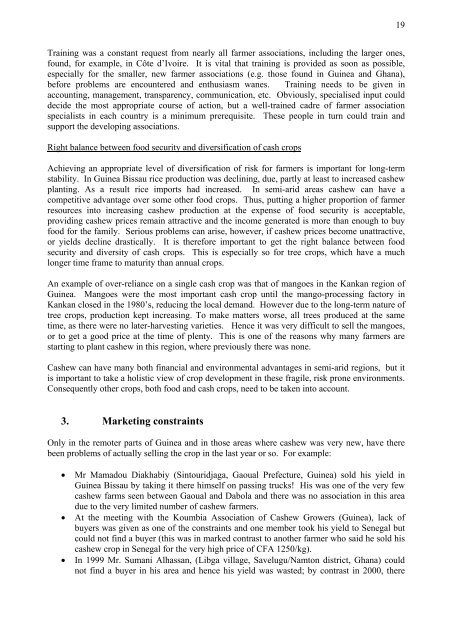
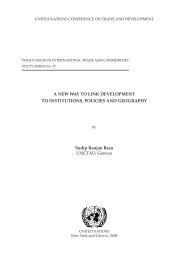
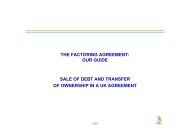

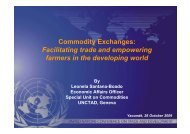
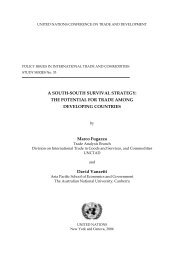

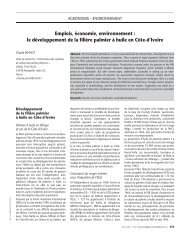
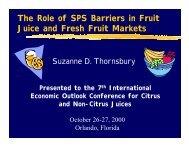

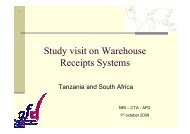
![Warehouse Receipt Systems: Legal Issues [PDF]](https://img.yumpu.com/43979338/1/190x134/warehouse-receipt-systems-legal-issues-pdf.jpg?quality=85)
